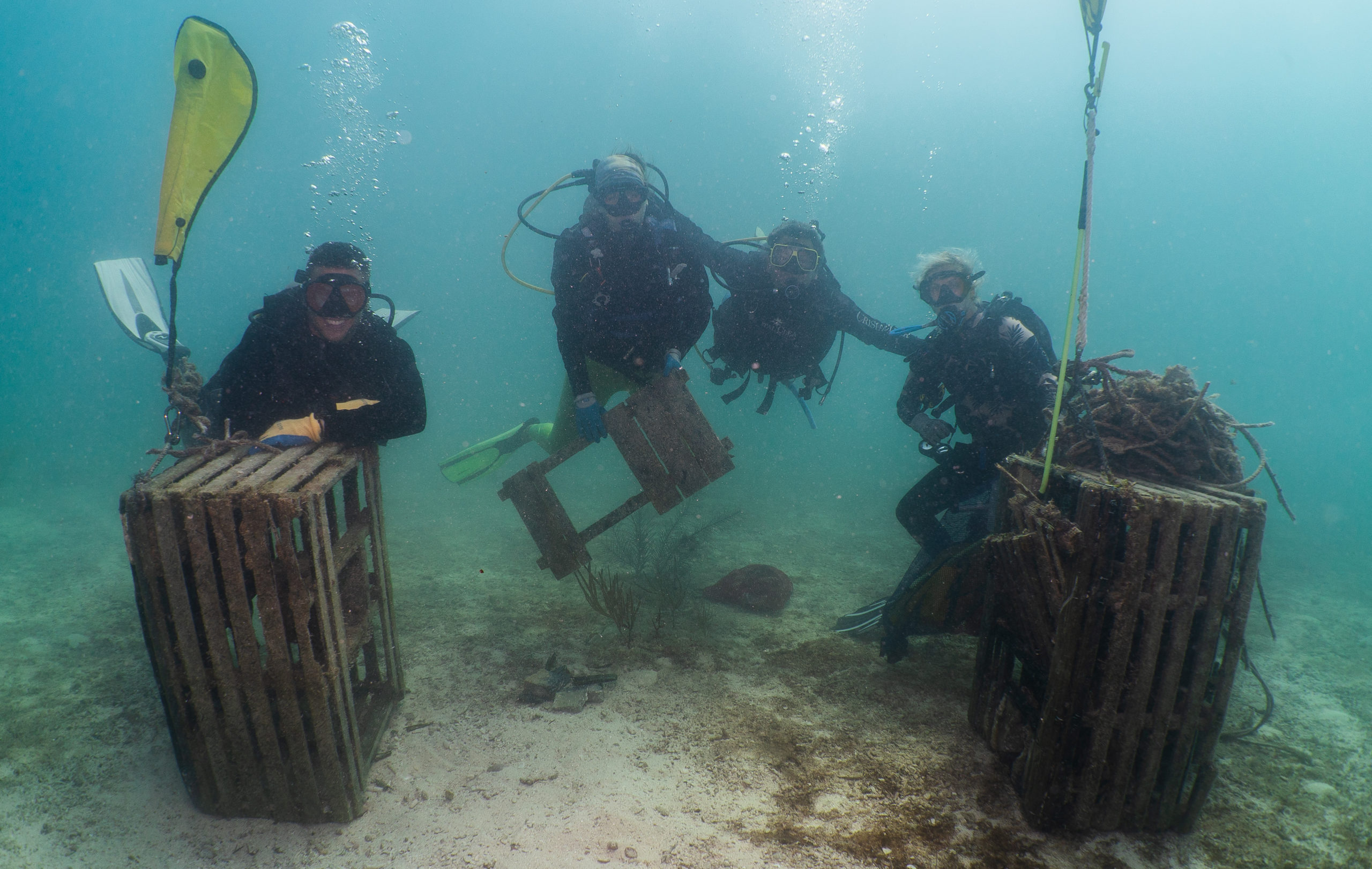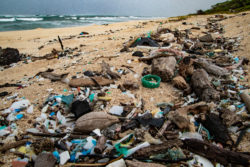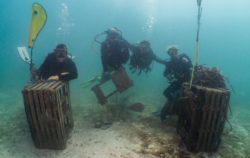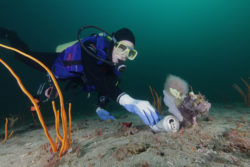
Marine Debris: Taking Matters into Your Own Hands

Trash piled up on the beach in Oahu off the waters of Hawaiian Islands Humpback Whale National Marine Sanctuary. Photo: Matt McIntosh/NOAA
Each year, billions of pounds of trash and chemical pollutants enter the ocean, changing the ocean’s chemistry, harming wildlife, and reducing the quality of beaches and other habitats that are far away from where the pollutants originate. Marine debris – particularly plastics – is one of the greatest challenges facing our global ocean and the waterways that lead to it. Most of the pollutants that enter the ocean come from land, rivers, and drainage pipes, though abandoned and discarded fishing gear is also a significant source of marine pollution. To say this is a problem of global importance is an understatement.
About the problem
The International Union for Conservation of Nature (IUCN) estimates more than 300 million tons of plastic are manufactured each year, 8 million of which end up in the ocean. In fact, nearly 80 percent of all marine debris that makes its way to the ocean is plastic. This is such a serious threat to marine life and habitats because plastic never fully decomposes, it just breaks down into smaller and smaller pieces called microplastics. Marine debris and plastics entangle wildlife, are mistaken for food and ingested, or make their way up the food chain and into the seafood we eat or the water we drink. Plastics, which are made from the byproducts of petroleum, also contribute to the effects of climate change.
For example, plastic shopping bags floating in the water column look just like jellyfish to unsuspecting turtles, who feed on these animals; when they eat plastic, whether on purpose or not, their digestive systems cannot pass real food and the consequences are deadly. Entanglement around the fins, faces, and flippers of marine animals also cause long term damage to animals’ bodies, which can lead to infected cuts or impede their abilities to properly move, eat, and breathe. Finally, microplastics and plastic compounds have been found in tap water, beer, table salt, and fish; these plastics can disrupt our hormones and have other effects on our health, some of which are known and others we are just learning about.

Divers with The Dive Shop at Ocean Reef Club remove debris from Florida Keys National Marine Sanctuary as part of a Goal: Clean Seas Florida Keys cleanup. Photo: Alisia Carlson/The Dive Shop at Ocean Reef Club
What we can do to solve it
While marine debris and plastics pollution is a global problem that needs large-scale solutions, we can each do our own part to help reduce the world’s reliance on plastics and prevent it from ever making its way to the ocean. Here are some ways you can make a difference for the ocean this year:
Refusing single use plastics is one of the best ways we can prevent plastics from entering our waterways and the ocean altogether. Plastic alternatives exist on the market for everyday products ranging from straws to shopping bags and from drinking bottles to utensils. When we replace single-use plastics in our daily routines, we greatly reduce our local and global consumption of these materials.
Choose more sustainable packaging. Plastic-free packaging is available for products like bulk groceries and hygiene products, including soap, razors, and toothbrushes. The small piece of plastic film wrapped around a bar of soap may not seem like much (and isn’t really necessary) but think about how much soap we use in a year or a lifetime.
Plan or participate in a local cleanup. All of our neighborhoods are uphill from the ocean, so any trash that ends up in our parks, forests, mountain trails, or beaches can be washed downhill and end up in the ocean. Where we can’t prevent litter, which often ends up out of place by accident, removal is a great option. The added bonus is that it can be fun! Seeing who can collect the most garbage by weight or the most unique items is a great way to add a competitive element to making your community and our work a better place! Here are some cleanup programs we love for inspiration:
Goal: Clean Seas Florida Keys works with Blue-Star dive operators to remove underwater marine debris from local reefs. You can join one of their trips as a volunteer and learn how they tackle marine debris!
On the west coast, Washington CoastSavers hosts organized beach cleanups year-round. In the spring they host the Washington Coast Cleanup (this year, it takes place on April 17th!) and, in the fall, they participate in the Annual International Coastal Cleanup where volunteers could participate in a global day of cleaning up coastlines while following CDC guidelines. During this time of uncertainty, you can also host a cleanup for yourself or your family where you can properly socially distance yourself in your neighborhoods or somewhere nearby.
Recycle when you can and dispose of trash properly when you can’t. It would be incredible if all of the products we used in our daily lives could be recycled and repurposed to reduce the raw materials needed to produce new items. However, not all cities and counties have the same recycle equipment or policies. Research your local recycling requirements to make sure what goes in your recycling bin belongs, and what doesn’t is thrown out in a tied trash bag. For example, some cities allow for single-stream recycling while others require residents to separate certain materials from others. Contaminated loads of recycling have to be taken to the landfill, so doing our part to be conscious of how we recycle can make a big difference.
Consider composting. Everything from fruit and vegetable peels to certain types of labeled packaging can be composted with the right equipment. You can reduce food waste and create nutrient-rich soil for your own garden by composting. The simplest compost piles just require a boundary (like a fence or a sturdy bin with drilled holes) and some dirt while more technological options allows you to compost your food scraps and appropriate packing right in your home while minimizing bad smells and other parts of this natural process of food decomposition.
Support organizations like the National Marine Sanctuary Foundation that have programs dedicated to the prevention and cleanup of marine debris. We can’t do the important work we’re passionate about without the generous support of our donors.

Dive picking up marine debris within the waters of Gray’s Reef National Marine Sanctuary. Photo: Greg McFall
